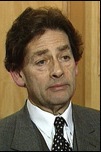This article is more than 1 year old
Nigel Lawson: Climate science has turned into religion
Why a think tank? Why now?
Interview One thing is missing from the Global Warming Policy Foundation, launched at Westminster on Monday, chairman Lord Lawson admitted. Mrs Thatcher's Chancellor for six years acknowledged that there aren't many young people on board. The average age of the Trustees is 74. You could almost say it pits the Old Aged vs the New Agers.
We got a brief opportunity to talk to Lawson at the launch event - more below.
The think tank is really Benny Piesar's show. The Liverpool anthropologist and policy academic, widely known for founding the CCNet mailing list, is the Foundation's director. The body may disappoint people who want the scientific controversies tackled head on. It's not going to look for the scientific 'smoking pistol' that skeptics crave. What's the point, then?
As with Lawson's book An Appeal To Reason, which dissected the Stern report, it is going to take a look at the policies - and ask whether they're worth it. Lawson resents the assumption, which he said was expressed by state broadcaster the BBC, that if you accepted the majority view of scientists in the field then you had to accept the policies they proposed, too. That's for a democracy to decide.
But speaking to Lawson later, it was clear he didn't think some of the wilder predictions made for man-made global warming had any rational basis.

Lawson
"There is no scientific basis for some of the alarmism. I'm talking about the predictions of warming, and the measurement of the impacts. There's huge alarmism there."
He referred to what he called a "a disgraceful television advertisement" from the Department of Energy and Climate Change. He means the one with the drowning dog.
"We will certainly be actively involved in monitoring what is being said, in correcting errors where the are errors. The only thing we will not be actively engaged in is what are the causes of the temperature changes on the planet: how much is CO2, how much is solar radiation, how much is cosmic rays. We won't be getting into all that."
Lawson was Chancellor when Crispin Tickell, then British Ambassador to the UN, convinced Prime Minister Thatcher that man-made global warming was a problem. Despite Tickell lacking any scientific background (he read history at university) Mrs Thatcher took the population campaigner's views seriously enough to make a landmark speech on global warming. This led to the foundation of a branch of the Met Office, the Hadley Centre at Exeter, to study the issue. It remains one of the three leading climate institutes.
"[Global Warming] wasn't really getting a head of steam back then. It did after I left in the 1990s. I left in 1989," he cautions. But did Lawson anticipate, back then, that it would become this all-encompassing movement?
